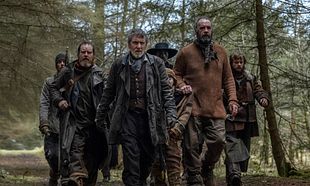Played out from three different perspectives, 'The Last Duel' recounts the story of the last legally sanctioned duel in 14th century France. Marguerite de Carrouges (Jodie Comer) accuses Jacques le Gris (Adam Driver) of rape, and her husband Jean de Carrouges challenges him to a fight to the death to determine whether or not he is guilty.
Although one might be inclined to draw a comparison between Ridley Scott's excellent first movie - 'The Duellists', with Harvey Keitel and Keith Carradine crossing swords in Napoleonic France - there is absolutely none. Indeed, 'The Last Duel' is quite unique in Scott's oeuvre, and not just for its triptych approach to story structure. It's rare that Ridley Scott would drive so forcefully at a topic the way he does here, as previous works like 'American Gangster' or even 'Alien' were far more subtle. Each of the three viewpoints tells a different story, yes, but they're almost completely different movies.
Matt Damon's character opens the movie from his viewpoint, with his character as a righteous warrior who has neither the political know-how nor the gift of persuasion to help his standing among the nobility of medieval France. His character is, of course, front and centre for this part and Jodie Comer is relegated to the idea of a doting wife, while Adam Driver's character is portrayed as a once-loyal friend betrayed to him by Ben Affleck's foppish nobleman who has taken a dislike to Matt Damon. The how and why of the sexual assault of Jodie Comer's character is almost inconsequential in this telling. To Damon's character, he's been insulted numerous times prior to this and the duel between he and Driver's character is long-simmering.
To Adam Driver's character, the whole sequence of events plays out like some kind of melodramatic romance. It is complete with stolen glances across faires, candlelight entreatments, sexual tension, and an orgy that he participates in almost out of politeness that sees Affleck's character joyfully proclaim to him, "Welcome! Take off your pants and let's get started!" When it comes to the rape, however, it plays out like a moment of rough passion between two lovers. Of course, by the time it arrives at the telling of Jodie Comer's character, the truth doesn't arrive as a shock because the broad strokes with which all characters have been painted practically begs you to not trust them.
The main trio plays their roles in the three different tellings completely differently, yet Jodie Comer shines above them all in her act. Matt Damon's performance in the first act is bland but physical in its actions. When we see him in the second act, he's almost a bumbling idiot who's far too conceited to see how he's viewed by people. By the third act, he's a grim-faced pariah who takes his failures out on his baffled wife. Adam Driver, meanwhile, is a well-meaning fop in the first act, a wearied romantic in the second, and a violent rapist in the third. Likewise, Jodie Comer bounces between a fair maiden, a willowy coquette, and finally a rounded, human woman who is caught between the vileness of her time and the horrors of what's been done to her.
Ridley Scott cleanly delineates between the acts, and the choice of editing and pacing for them never allows for any confusion. Yet, in the violence of the finale, 'The Last Duel' loses any chance of subtlety. The two men beat each other to within an inch of their lives, the sound design pings off sword clashes and joust explosions, and it's all done incredibly well. The concept of showing three different perspectives may initially lead you to think it's going to be a ponderous affair, but the action is too well choreographed for that. The whole story is complex, and the script by Affleck, Damon, and Nicole Holofcener bravely attempts to show the nuances of it all. More than that, each of the voices feels clear in the script. Holofcener's vibrant humanity shines through in the third act, while Affleck and Damon both joust with themselves in florid dialogue for their acts.
Yet, curiously, for all of the misogyny and the sexism that it attempts to challenge and highlight, 'The Last Duel' gives more importance to the two combatants than it does to the victim. This might be because Jodie Comer's character was effectively sidelined from history and her own story was largely forgotten, but that's probably a generous interpretation. As it stands, 'The Last Duel' tilts at complex subjects and themes in a courageous fashion, but can't stop itself from hacking them to pieces.



















































































